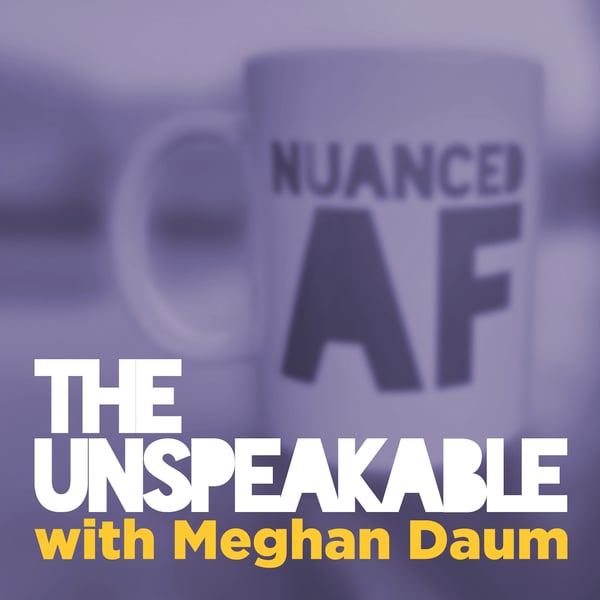Are there any off-limits subjects between you and your therapist?
The Unspeakable Podcast
Meghan Daum
4.8 • 784 Ratings
🗓️ 9 October 2023
⏱️ 72 minutes
🧾️ Download transcript
Summary
Today’s guest, Dr. Andrew Hartz, is a psychologist who has noticed how politicized the world of therapy has become. Over the last few years, he has noticed a climate of patients not being able to talk about what’s on their mind without getting a lecture from their therapist about racial injustice, as well as an environment that teaches clinicians to look at patients through a politicized lens.
Guest Bio
Dr. Andrew Hartz’s is a clinical psychologist who holds the position of a professor of clinical psychology at Long Island University in Brooklyn. Hartz received training at Columbia Medical Center, Mount Sinai Hospital, and the William Alanson White Institute, and has completed coursework at Columbia University, Columbia Medical Center, Haverford College, and Long Island University. He uses evidence-based tools from CBT, DBT, and psychodynamic psychotherapies to address the unique needs of each patient.
He is also the founder of The Open Therapy Institute which offers mental health resources for overlooked patient populations in a heated political atmosphere.
Want early access to episodes and bonus conversations? Upgrade your subscription here.
HOUSEKEEPING
☕️ Follow me on Substack.
🔥 Follow my other podcast, A Special Place in Hell.
🥂 Join The Unspeakeasy, my community for freethinking women.
Transcript
Click on a timestamp to play from that location
| 0:00.0 | Welcome to the Unspeakable Podcast. I'm your host, Megan Dome. So this episode is about |
| 0:08.9 | therapy. Psychotherapy, or any kind of counseling for mental health issues, is supposed to offer a safe, |
| 0:16.8 | non-judgmental space for patients to talk about anything at all, especially their darkest or |
| 0:22.3 | most confusing thoughts or emotions. But I have heard a lot of people talking lately about being |
| 0:28.1 | afraid to bring certain things into the therapy room, especially issues around politics and |
| 0:33.3 | identity for fear of being judged or even admonished by their therapist, even called racist or |
| 0:39.8 | sexist by their therapist. I have also heard people say that they had a therapist who was |
| 0:45.5 | poised to frame all of their issues as stemming from things like racism or sexism. |
| 0:51.3 | In other words, it's not your mother's fault. It's systemic discrimination. |
| 0:55.5 | I have also heard therapists. I talk to people a lot about therapy, I guess. I've heard therapists |
| 1:01.5 | who don't practice that way talk about their fears of being censured by peers or colleagues |
| 1:07.3 | in the profession for not being progressive enough. Now, this sounds kind of unbelievable, |
| 1:13.4 | and 10 or 15 years ago it might have been, but our current landscape has made these dynamics |
| 1:19.3 | all too real, which is why my guest, clinical psychologist Dr. Andrew Hartz, founded the |
| 1:25.0 | Open Therapy Institute. In this conversation, he'll tell us what that is |
| 1:29.3 | and also explain how and when things started to change. We talk about what kinds of people become |
| 1:35.0 | therapists, how unchecked empathy, that's my phrase, not his, can lead to bad therapy, |
| 1:41.4 | and how he feels about sessions conducted on Zoom as well as new models like |
| 1:46.1 | Better Help. Just so you know, there is no bonus portion of this episode. So if you are a paying |
| 1:52.2 | subscriber on the substack, you get a break this week. Or I get a break. If you are a founding member, |
| 1:58.5 | I am here by announcing that I'll be hosting a Zoom hangout |
| 2:01.7 | on Sunday, October 29th at 8 p.m. Eastern Time. |
... |
Please login to see the full transcript.
Disclaimer: The podcast and artwork embedded on this page are from Meghan Daum, and are the property of its owner and not affiliated with or endorsed by Tapesearch.
Generated transcripts are the property of Meghan Daum and are distributed freely under the Fair Use doctrine. Transcripts generated by Tapesearch are not guaranteed to be accurate.
Copyright © Tapesearch 2025.

